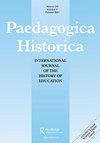“Work hard my child, don’t be a civil servant; become an entrepreneur!” New subjects and entrepreneurship in textbooks from the late Ottoman Empire
IF 0.3
4区 教育学
Q4 EDUCATION & EDUCATIONAL RESEARCH
引用次数: 0
Abstract
ABSTRACT The late Ottoman Empire witnessed many remarkable developments in entrepreneurship, especially at the beginning of the twentieth century. Turkish subjects, who had been mainly seen as oriented towards the civil service, were encouraged to take initiatives in areas such as agriculture, trade, and craft. Besides the effective use of the Ottoman press, education was also applied for this purpose. Curricula and textbooks that should make education functional came into operation. Entrepreneurship was one of the important subjects discussed in various dimensions in primary-school textbooks prepared in line with the renewed curricula after the Revolution in 1908. This study shows that efforts to raise entrepreneurial citizens were not something new in Turkish society. By focusing on four main textbooks taught at the primary education level in the late Ottoman Empire, economic contents have been analysed. Prepared and approved by officials, these textbooks suggested that children should be made aware of the enterprise idea [fikr-i teşebbüs], private enterprise [teşebbüs-i şahsî], the characteristics that the entrepreneurs should have, and acceptable entrepreneurship areas. Within this framework, they were directed to become entrepreneurs.“好好学习吧,我的孩子,不要当公务员;成为一名企业家!”奥斯曼帝国晚期教科书中的新主题和企业家精神
奥斯曼帝国晚期见证了企业家精神的许多显著发展,特别是在20世纪初。土耳其臣民被认为主要面向公务员制度,现在被鼓励在农业、贸易和手工业等领域采取主动行动。除了有效地利用奥斯曼报纸,教育也被用于这个目的。使教育发挥功能的课程和教科书开始运作。企业家精神是1908年革命后根据更新课程编写的小学教科书中多方面讨论的重要主题之一。这项研究表明,培养创业公民的努力在土耳其社会并不是什么新鲜事。通过关注奥斯曼帝国晚期小学教育阶段的四种主要教科书,分析了经济内容。这些教科书由官员编写和批准,建议儿童应了解企业理念[fikr-i te ebb s],私营企业[te ebb s-i şahsî],企业家应具有的特征,以及可接受的创业领域。在这个框架下,他们被引导成为企业家。
本文章由计算机程序翻译,如有差异,请以英文原文为准。
求助全文
约1分钟内获得全文
求助全文
来源期刊

PAEDAGOGICA HISTORICA
Multiple-
CiteScore
0.90
自引率
40.00%
发文量
72
期刊介绍:
"Paedagogica Historica is undoubtedly the leading journal in the field. In contrast to a series of national journals for the history of education, Paedagogica Historica is the most international one." A trilingual journal with European roots, Paedagogica Historica discusses global education issues from an historical perspective. Topics include: •Childhood and Youth •Comparative and International Education •Cultural and social policy •Curriculum •Education reform •Historiography •Schooling •Teachers •Textbooks •Theory and Methodology •The urban and rural school environment •Women and gender issues in Education
 求助内容:
求助内容: 应助结果提醒方式:
应助结果提醒方式:


